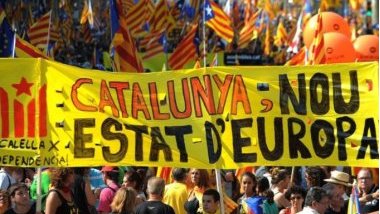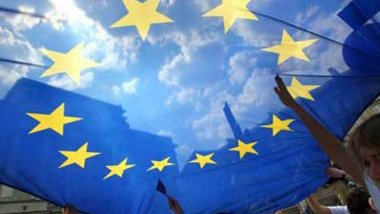41 years ago we conquered Freedom in Portugal. It was conquered by popular pressure, well visible in the streets of Lisbon on the 25th of April and throughout all the country in the following months. One year later, the European Parliament approved the decision to establish direct elections, the first democratic step at the European level. We’ve come a long way since then, however some of the criticisms the EU has perpetually faced are not yet obsolete.
We can easily point out some of the democratic flaws of the current European configuration: The president of the Commission is nominated by the Heads of State and Government; the European Council is still governed by political elites who negotiate apart from the institutions; the Parliament, the body representing the European people, cannot propose legislation, unlike any national parliament.
No, the European Union is not anti-democratic. It operates on a system of checks and balances, in which each institution is submitted to the control of another, and all directly or indirectly accountable to the electorate. But it’s also not a democracy, if we consider the filtering process of the popular will made by the institutions and especially the States, from the vote to concrete European action.
In its current shape, the EU is a club of democracies where national politicians take decisions at the European level for which they blame “Brussels” at the national level. This EU is still incapable of responding to the needs of its citizens. We witnessed how the crisis was allowed to spread in the Eurozone due to stalling and lack of political initiative, and how that was all it took to turn States against States, and for them to adopt a zero-sum mentality. But fresher in our memory is the death of hundreds of refugees in the Mediterranean as a result of European inaction in the face of calls for the creation of a European policy of migration. Globalisation destroyed frontiers, and politics cannot remain under walls either. What we propose is not to end national democracies, but to complete them at a new level: European democracy.
We do not agree with those who say that there is no such thing as an European People, and that there will never be a European democracy for that reason. The forces of globalisation, as well the European Union itself, gave their contribution to make it common that someone identifies themselves as European, as well as nationals of their own country.
We can mention concrete incremental proposals that aim to eliminate the democratic deficit and mobilise the electorate: That European elections have transnational lists; that national vetoes be reduced; that citizens elect the President of the European Commission; that the monetary union be completed with a political union.
In any case, a change of the structures altering the powers of the institutions, and the way they are elected in this sense, necessarily means opting for a federal model. This needs to be said, as it is the mere symbolism of this fact that prevents countries from accepting the democratisation of Europe.
The authors of this text were born in a Portugal both democratic and integrated in Europe, which is how we want it. The challenge made is that the achievements of April and of the European project are safeguarded, transforming the European Union into a Federal Union, where a European national of one country has the same weight in decision-making as any other one.
What we want is, simply, to take April to Europe.





Follow the comments: |
|
